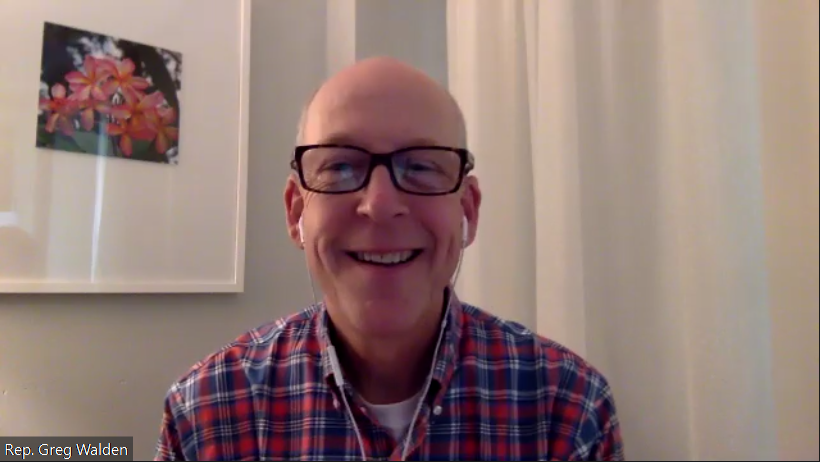
Walden Reflects on Results of the Election & GOP Prospects Moving Forward
WASHINGTON, DC — The Ripon Society held a virtual discussion this past Tuesday with U.S. Rep. Greg Walden (OR-2), who discussed the results of the November 3rd election and shared his thoughts on the future of the Republican Party and the legislative agenda in Congress in the year ahead.
“I want to start by giving a big shout-out to Tom Emmer and his entire team at the NRCC,” stated Walden, who helmed the House GOP campaign committee himself from 2012-2016, helping his party win and maintain a historic majority during that time. “It is a very professionally run organization. They did what they needed to do, not only in terms of running the races, but also — the most important piece of it — in terms of recruiting good candidates.
“The work that Susan Brooks did as chair of the NRCC recruitment team really made a difference. We have more people of color. We have more veterans. And we have more women. We’ve got a long way to go, but this was an enormous first step forward. I credit Tom and his team, and I credit Kevin McCarthy, Steve Scalise and everybody in the leadership effort, as well.”
It was an effort, Walden noted, that saw House Republicans flip at least eight seats held by Democrats and elect a record number of women to the U.S. House. It was also an effort, he added, that saw Republicans overcome a much anticipated — and much reported on — “blue wave” by Democrats that never came to pass.
“I think some of the polling that appeared in the Washington Post and elsewhere toward the end claiming Biden had this enormous lead makes you wonder — how did they get it so far wrong?” the Oregon Republican said. “What were they watching that caused them to be so far off? I also want to go to the prognosticators who opine on these matters for a living and were arguing that Democrats were going to pick up 15 to 20 seats in the House. They need to be reassessed for their accuracy and their predictions. This is what they do for a living. It’s amazing cycle after cycle, how far off they are.
“If I were in their business, I’d be wondering how did I get it so wrong? And what data was I relying upon that caused me to say a day or two before the election that Democrats are likely going to pick up 15 to 20 seats in the House and that there is a blue wave coming? These are important questions, because when your race gets moved from one category to another, the donor community looks at that, the press looks at that, the candidates certainly look at it, and it has a consequential effect on a race.”
As for the coming year in Congress and GOP prospects in 2022, Walden said he was “bullish” about what Republicans can achieve moving forward.
“This was a repudiation election of the socialist, defund-the-police policies of the Democrats,” he stated matter-of-factly. “It also became a referendum election on the President — not on his policies, but his personality. Joe Biden was elected by a very thin and weak coalition. Half of Biden’s vote was an anti-Trump vote. It’s always hard in politics to energize somebody when the symbol they rallied against is out of the equation. It will be hard to reconstitute that coalition that put Biden over the top.
“If I were handicapping 2022, I’d be pretty excited as a Republican in the House by the prospect that they now have probably less than eight or nine seats to flip to win back the majority. It will also be a worse year for Democrats because history shows that the party in power in the White House has a very difficult time in the first cycle. So, I’m pretty bullish about what 2022 looks like for the GOP.”

Following his opening remarks, Walden — who will be retiring from Congress at the end of this year — was asked a number of questions, including one about the GOP and how both parties have changed.
“We’ve gone through several evolutions,” he said. “Ronald Reagan created a new coalition that saw lunch bucket, blue collar, disaffected Democrats come into the party. It was focused on balancing the budget, cutting taxes, cutting regulations, individual liberty, standing up to Russia, and taking a lean-forward posture on defense and security issues. It was a coalition that lasted for, I would argue, at least 12 years, maybe longer.
“Then we went through a different period with Clinton, but Clinton also built his own working class, ‘It’s the economy stupid,’ ‘I feel your pain’ coalition. Then after that, of course, we had President Bush, who brought a different tone and tenor and built a caring, conservative coalition that earned him back-to-back wins. Obama came along and constituted, I would argue, a different coalition for the Democrats. One of the mistakes that Democrats made in the House elections is that they thought Obama voters were Democrat voters. Some of our success came about because they couldn’t turn out those voters in the midterms. Then you get to Trump. And I would argue that, in many respects, Donald Trump recreated the Republican Party that now is appealing more and more toward working class people.
“If you think about the dynamics, the people who were in the Republican Party, some of whom have left, were probably more of the country club set elite. I’m not throwing rocks here. I’m just trying to describe them. They were very offended by different elements of the Trump presidency or the dialogues that surrounded the Trump presidency. They were pushed out. I have friends who, because I wouldn’t renounce Donald Trump on a regular basis, put me in a category of people they didn’t want to be around anymore. But I would also argue that there was this enormous flow into the Republican Party of disaffected blue collar, working class folks who felt that the AOC socialist agenda and the extreme agenda of the left did not appeal to them.
“The Democrats are going to have to explain how they’re not part of the riots that have gone on in Portland and elsewhere for four years. Remember, they started rioting in Portland or protesting or whatever you want to call it the day after Trump was elected and it’s never stopped. I mean, these people broke windows in the Democrat office in downtown Portland either last night or the night before — they’ve never quit. And I’ll tell you, they own that. They own that. They’re going to have to figure that out.”
To that end, Walden was also asked how he thought House Democrats would govern coming out of the election.
“They’ve got a big fight going on over there,” he observed.“Speaker Pelosi has not pushed back on the socialist moniker or agenda. They’ve gotten so far out with their base that I think they’re going to have real trouble. They’ve got real trouble. They’ll get organized eventually, but the question is where do they go moving forward.”
Walden did express optimism that agreement can be reached in a number of areas, including an area he has overseen as the top Republican on the Energy and Commerce Committee: high-speed broadband.
“If there was ever a time for bipartisan support to build out high-speed broadband,” he stated, “it is during this pandemic. One of the things we need to make sure of, though, is that we are not paying to overbuild where commercial networks already exist. You’re always going to have a little bit of overbuild because you have to connect. But beyond that, I think it’s really important that we do continue to connect America. You’ve got 20 to 30 million Americans who still lack access to a high-speed data communications. We need to step it up, and I think Congress can find bipartisan support to do that.”
As for the prospects of a grand bargain between the parties on the national debt or on another critical challenge facing our country, Walden said he thought such action was unlikely to occur, particularly during this time of uncertainty.
“I think what most people want right now is stability,” the veteran lawmaker stated. “They aren’t looking for Congress to up-end the tax code or re-regulate and rewrite everything. They’re just looking for a little calm. And really, that’s how the House and Senate are set up right now, with razor-thin majorities in both. Big things probably aren’t going to get jammed through. And that’s not all bad.”
The Ripon Society is a public policy organization that was founded in 1962 and takes its name from the town where the Republican Party was born in 1854 – Ripon, Wisconsin. One of the main goals of The Ripon Society is to promote the ideas and principles that have made America great and contributed to the GOP’s success. These ideas include keeping our nation secure, keeping taxes low and having a federal government that is smaller, smarter and more accountable to the people.



